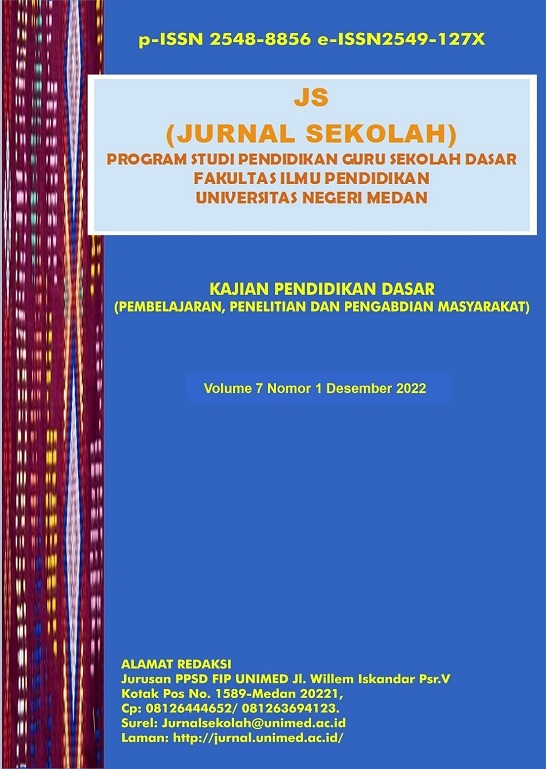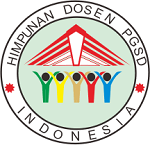PENGARUH METODE PEMBELAJARAN DISKUSI BUZZ GROUP TERHADAP HASIL BELAJAR SISWA PADA MATA PELAJARAN MATEMATIKA KELAS IV di SDN 1 SP.Padang
DOI:
https://doi.org/10.24114/js.v7i1.36828Abstract
Abstract: This study was conducted to determine whether there is an effect of the buzz group discussion learning method by comparing the learning outcomes of the experimental class and the control class in mathematics. The research was conducted at SDN 1 SP. Padang with the research subjects being fourth grade students. The research method used in this research is pre-experimental designs with intact-group comparison research design. The sampling used in this research is purposive sampling. The sample used in this study was class IV A as the control class and class IV B as the experimental class with a total of 48 students. Data collection techniques used in this study are test, observation and documentation techniques. The instrument has passed the validity test using the product moment correlation and the reliability test using the Alpha formula. The data that had been collected were then analyzed to see the difference in learning outcomes of the t-test (independent t-test) which was calculated manually. The results showed that student learning outcomes in the experimental class with an average of 71.79 while the average in the control class was 57.58. The level of significance used is 5%. Based on the results of the calculation of data analysis, the value of t_count > t_table is 3.83 > 2.021, it shows that H_o is rejected and H_a is accepted. From the results of the data analysis, it can be concluded that the hypothesis which states that there are differences in student learning outcomes between classes that apply the buzz group discussion learning method and classes that do not apply the buzz group discussion learning method to student learning outcomes in class IV mathematics subjects at SDN 1 SP .Padang.Keywords: buzz group discussion learning method, learning outcomes and mathematicsAbstrak : Penelitian ini dilakukan untuk mengetahui apakah terdapat pengaruh metode pembelajaran diskusi buzz group dengan membandingkan hasil belajar kelas eksperimen dan kelas kontrol pada mata pelajaran matematika. Penelitian dilakukan di SDN 1 SP.Padang dengan subyek penelitian adalah siswa kelas IV. Metode penelitian yang digunakan dalam penelitian ialah pre- Experimental designs dengan bentuk desain penelitian intact-group comparison. Adapun pengambilan sampel yang digunakan pada penelitian ini adalah sampling purposive. Sampel yang digunakan dalam penelitian ini adalah kelas IV A sebagai kelas Kontrol dan Kelas IV B sebagai kelas eksperimen dengan jumlah seluruh siswa 48 orang. Teknik pengumpulan data yang digunakan dalam penelitian ini adalah teknik tes, observasi dan dokumentasi. Instrument telah melalui uji validitas menggunakan korelasi product moment dan uji reabilitas menggunakan rumus Alpha. Data-data yang berhasil dikumpulkan kemudian dianalisis untuk melihat perbedaan hasil belajar uji-t (independent t-test) yang dihitung secara manual. Hasil penelitian menunjukan bahwa hasil belajar siswa pada kelas eksperimen dengan rata-rata 71,79 sedangkan rata-rata dikelas control adalah 57,58. Taraf signifikansi yang digunakan sebesar 5%. Berdasarkan hasil perhitungan analisis data yang diperoleh nilai yaitu 3,832,021 maka menunjukan bahwa . Dari hasil analisis data tersebut maka dapat disimpulkan bahwa hipotesis yang menyatakan terdapat perbedaan hasil belajar siswa antara kelas yang menerapkan metode pembelajaran diskusi buzz group dengan kelas yang tidak menerapkan metode pembelajaran diskusi buzz group terhadap hasil belajar siswa pada mata pelajaran matematika kelas IV di SDN 1 SP.Padang.Kata Kunci : metode pembelajaran diskusi buzz group, hasil belajar dan matematikaDownloads
Published
2022-12-22
How to Cite
Purnama, I., Imansyah, F., & Noviati, N. (2022). PENGARUH METODE PEMBELAJARAN DISKUSI BUZZ GROUP TERHADAP HASIL BELAJAR SISWA PADA MATA PELAJARAN MATEMATIKA KELAS IV di SDN 1 SP.Padang. JS (JURNAL SEKOLAH), 7(1), 50–56. https://doi.org/10.24114/js.v7i1.36828
Issue
Section
Articles
License
Copyright (c) 2022 Indah Purnama, Farizal Imansyah, Noviati Noviati

This work is licensed under a Creative Commons Attribution-ShareAlike 4.0 International License.

Jurnal Sekolah is licensed under a Creative Commons Attribution-ShareAlike 4.0 International License.
















